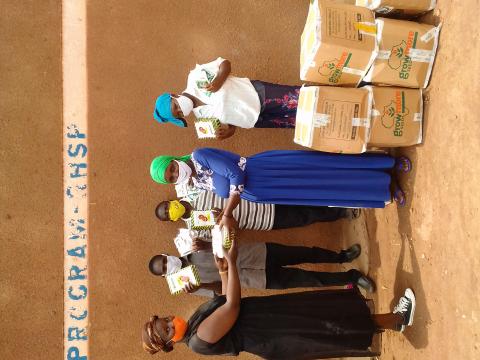WORLD VISION DISTRIBUTES SEEDS IN RAKAI AS PART OF ITS COVID-19 RESPONSE

WORLD VISION DISTRIBUTES SEEDS IN RAKAI AS PART OF ITS COVID-19 RESPONSE
There is no doubt that the COVID-19 Pandemic is not only a health crisis but also a threat to food security and nutrition to millions of people around the world.
According to the UN Food and Agriculture Organisation, there is risk of a global food emergency that could have long-term impact on hundreds of millions of children and adults.
The latest UN estimates show that at a minimum, an additional 83 million people, and possibly as many as 132 million, may go hungry in 2020 as a result of the economic recession triggered by the pandemic. This is due mostly to a lack of access to food as incomes fall, remittances are lost, and in some contexts, food prices rise. It is no longer a food access issue alone, but increasingly a food production matter.
Solving the problem
As part of its Covid-19 response, World Vision Uganda integrated an aspect of Resilience and Livelihoods to strengthen social protection systems for nutrition through distribution of vegetable seeds as the backbone for vulnerable children and communities during the COVID-19 crisis and beyond to access nutritious foods.
In Rakai, World Vision conducted a vulnerability assessment for the communities in Lwamaggwa, Kyalulangira and Buyamba Area Programmes. Beneficiaries were then registered and trained in vegetable gardening, proper post-harvest handling and improved animal husbandry practices to ensure that households have a variety of foods to keep them in good health.
Consequently, 11,573 households were given seeds of various vegetables like kale, cabbage, tomatoes, onions, egg plants, and orange flesh sweet potato vines. Selected households were also given agricultural inputs, including herbicides, spray pumps and fertilizers.
What the beneficiaries say
“After the training, we immediately planted and are now harvesting. As a family we received various types of seeds such as kale, eggplants, onions which we will eat for a long time and also sell to increase our household income”, says Florence who lives in Lwamaggwa.
Her son, 13-year-old Sudaisi says, “We didn’t have vegetables before but World Vision has now given us. We are going to eat well. I have learnt how to water the plants so that they can grow well even during dry season. Thank you World Vision.”
World Vision has invested in training of households, procurement and distribution of agricultural inputs to farming communities it serves. The charity organisation also through Vision Fund has supported groups and individuals with low interest loans to recover their businesses that were affected by the COVID-19 pandemic.
“During training, we were told that one of the preventive measures against COVID-19 is eating healthy and nutritious foods like vegetables which are rich in Vitamin C and A. World Vision has responded in the most appropriate way by giving us these seeds. We shall grow these seeds, consume them and live a healthy life,” says a joyous Charles James, one of the beneficiaries.
Since March, World Vision has reached more than 5 million people (40% children) in its COVID-19 response. “Our prayer and hope as an organization is that vulnerable children, families and communities thrive through this pandemic and come out stronger,” says Freddie Opoka, COVID-19 Response director at World Vision Uganda.
Story by Mary Atuheire, World Vision Uganda